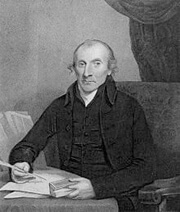Bible Commentaries
Joseph Benson's Commentary of the Old and New Testaments
Old Testament
New Testament
One of the most eminent of the early Methodist ministers in England, Joseph Benson was born at Melmerby, in Cumberland, Jan. 25, 1748. At sixteen he became a Methodist and was converted. In 1766 Mr. Wesley appointed him classical master at Kingswood School. He devoted himself closely to philosophy and theology, studying constantly and zealously.
Joseph Benson became a Methodist circuit rider in 1771. A close associate of Wesley, he was chosen to be a member of the Legal One Hundred who governed the Conference at Wesley's death and he was president of the Conference two times. As one of post-Wesley Methodism's most popular preachers, he sometimes addressed crowds of over twenty thousand.
Wesley established an extensive organization, including the circuit riding system and a media or press to showcase books, pamphlets, and a monthly magazine. After the death of John Wesley, Joseph Benson took over the Methodist/Wesleyan movement and the organization that Wesley created.
During the Bristol dispute of 1794 he led the conservative Church Methodists and was against moves which suggested that the Methodists were breaking ties with the Church of England; he was one of the last leaders to contend for the methods and philosophy of eighteenth-century Wesleyan Methodism.
The circulation of The Methodist Magazine rose from ten thousand to twenty-four thousand per issue on his watch, and it was one of the most widely read periodicals in pre-Victorian England. He was an able writer, serving as apologist against Joseph Priestley, as biographer of John Fletcher, and as author of a multi-volume commentary on the Bible.
Benson was influential in Methodism, and through the press, especially the magazine, he was able to extend his influence to non-Methodists as well. He and other Methodist leaders, through preaching and publication, disseminated their conservative social and political credo and may be credited in part with creating a climate in which the seeds of Victorianism could thrive.







Comments